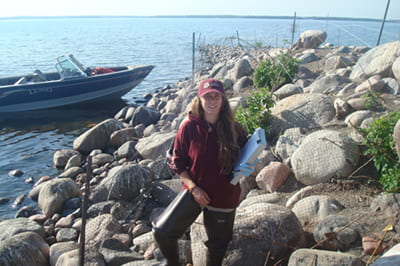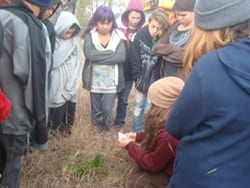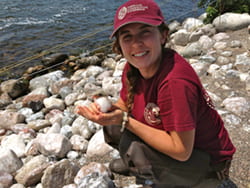2012 grad Morgan Gantz works to study and protect our nation’s wilderness
 For the millions of outdoor enthusiasts who enjoy hiking on the trails, kayaking down the rapid rivers, and biking through national parks, forests and wildlife refuges, there are the few who work to both study and protect the natural landscape of our public lands.
For the millions of outdoor enthusiasts who enjoy hiking on the trails, kayaking down the rapid rivers, and biking through national parks, forests and wildlife refuges, there are the few who work to both study and protect the natural landscape of our public lands.
Morgan Gantz, a 2012 UW-Green Bay Environmental Science graduate is working to do just that in an Interagency Wilderness Fellowship program with the U.S. Fish and Wildlife Service and American Conservation Experience.
“Generally speaking, Wilderness Fellows are educators and advocates of wilderness stewardship,” said Gantz. They have much to steward with over 100 million acres set aside in a land preservation system since President Lyndon B. Johnson signed into the law the Wilderness Act 50 years ago.
Gantz is spending six months working at two national wildlife refuges in Minnesota, Rice Lake and Tamarac. Out of 250 applicants for the fellowship, Gantz was one of eight selected. Her position began in May 2014.
Through this position, Gantz is working to establish a baseline condition and long term monitoring protocol for each refuge based on the five qualities of wilderness character. She is identifying measures specific to each location that quantify change over time. The goal is to create a tool land managers can use to better understand the wilderness they manage and to track trends over time.
“So my job is to evaluate a broad suite of biological indicators relating to water quality, air quality, climate change, and composition of native and invasive species among others,” Gantz said.
The program has also given her the chance to gain experience working with federal land management agencies.
 “As Wilderness Fellows we are exposed to all aspects of land management from office work and project management, to interacting with and educating staff, to fieldwork and regular maintenance. I have assisted biologists with counting bird population’s productivity success, banding birds, blowing up beaver dams to alleviate water flow, invasive plant surveys, ecological restoration activities, visitor services, and numerous education and outreach events.”
“As Wilderness Fellows we are exposed to all aspects of land management from office work and project management, to interacting with and educating staff, to fieldwork and regular maintenance. I have assisted biologists with counting bird population’s productivity success, banding birds, blowing up beaver dams to alleviate water flow, invasive plant surveys, ecological restoration activities, visitor services, and numerous education and outreach events.”
The broad range of practices that Gantz has taken part in have provided her with new challenges and learning experiences.
“It has really been a challenging position because I’ve had to independently identify what wilderness character means to each location. There is no ‘black and white’ on how to measure and assign values to the qualities that make up a wilderness within the framework, there can be a lot of greyness to creating protocols and is often left up to a judgment call of the local staff.”
Previous to this experience, Gantz worked on the Exotic Plant Management Team in Wrangell-St. Elias National Park and Preserve in Alaska during the summer of 2013, which actually has the largest wilderness in the whole National Wilderness Preservation System.
“Hiking along glaciers and enormous mountains was unreal,” Gantz, said, “It felt like a huge fantasyland up there. It was actually my mentor from that position, who is the ecologist for the Park that emailed me the job announcement for the Wilderness Fellowship program and urged me to apply because she thought it was a good fit.”
Gantz had several experiences during her time at UW-Green Bay that helped her to achieve what she has today. Of those, Gantz served as a terrestrial invasive species intern with the Shawano County Land Conservation Division, which she feels was the stepping-stone to achieve her position in Alaska.
 “I took Restoration Ecology as my senior thesis class and it was one of my favorites,” she said. “The concepts learned in that class I am constantly using and applying to my career development. I was fortunate to serve as a research assistant under Professor Mat Dornbush, which enhanced my technical skills and made my resume more competitive when applying for science related jobs.”
“I took Restoration Ecology as my senior thesis class and it was one of my favorites,” she said. “The concepts learned in that class I am constantly using and applying to my career development. I was fortunate to serve as a research assistant under Professor Mat Dornbush, which enhanced my technical skills and made my resume more competitive when applying for science related jobs.”
The relationships Gantz formed while a student here have influenced her as well.
“I made lasting connections with UWGB faculty, many of which I still use as references on job applications and whom I contact for professional advice. My education at UWGB was very rewarding and gave me all of the valuable skills that are helping me succeed in this fellowship today.”
When looking to the future, Gantz is interested in various options.
“I am currently looking for job opportunities within the field of wilderness management, habitat restoration and management, or conservation related work but also considering further education into graduate school. I have been enjoying traveling and working seasonal jobs but often times I am looking for more of a challenge and feeling an eagerness to learn more.”
Gantz is thankful for the opportunities that she’s been given.
“As a Wilderness Fellow, I am proud to support our nation’s most wild lands,” she said, “The Wilderness Fellows program has been the opportunity of a lifetime for me, and a valuable resource for our federal land managers.”
For more information.
Story by Katelyn Staaben, editorial intern, Marketing and University Communication
Photos submitted



